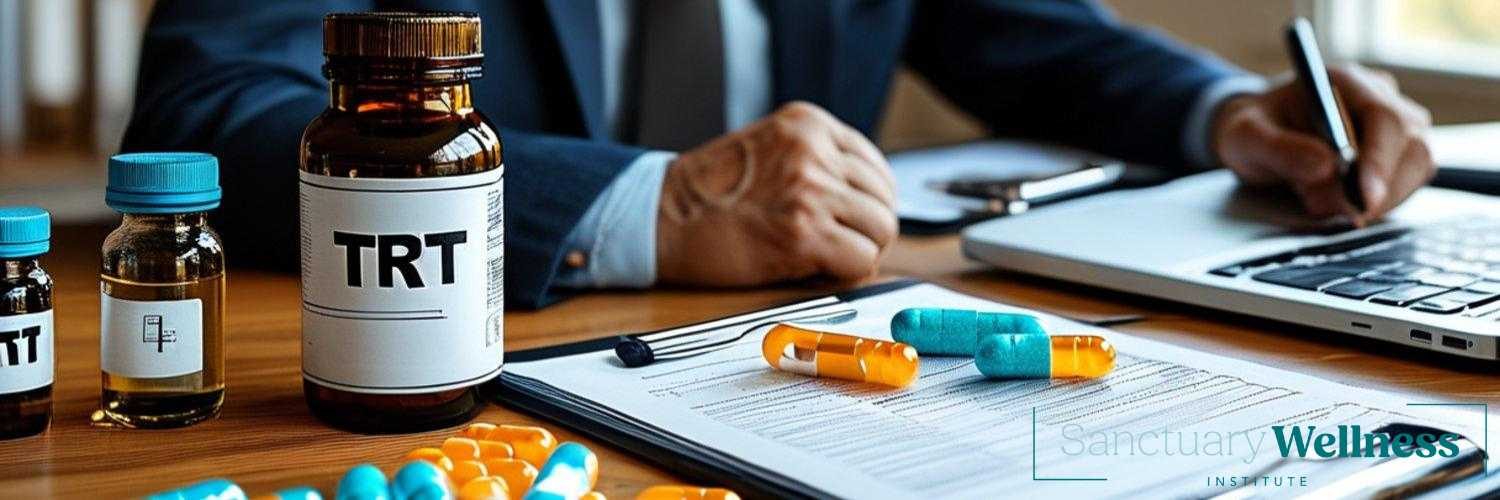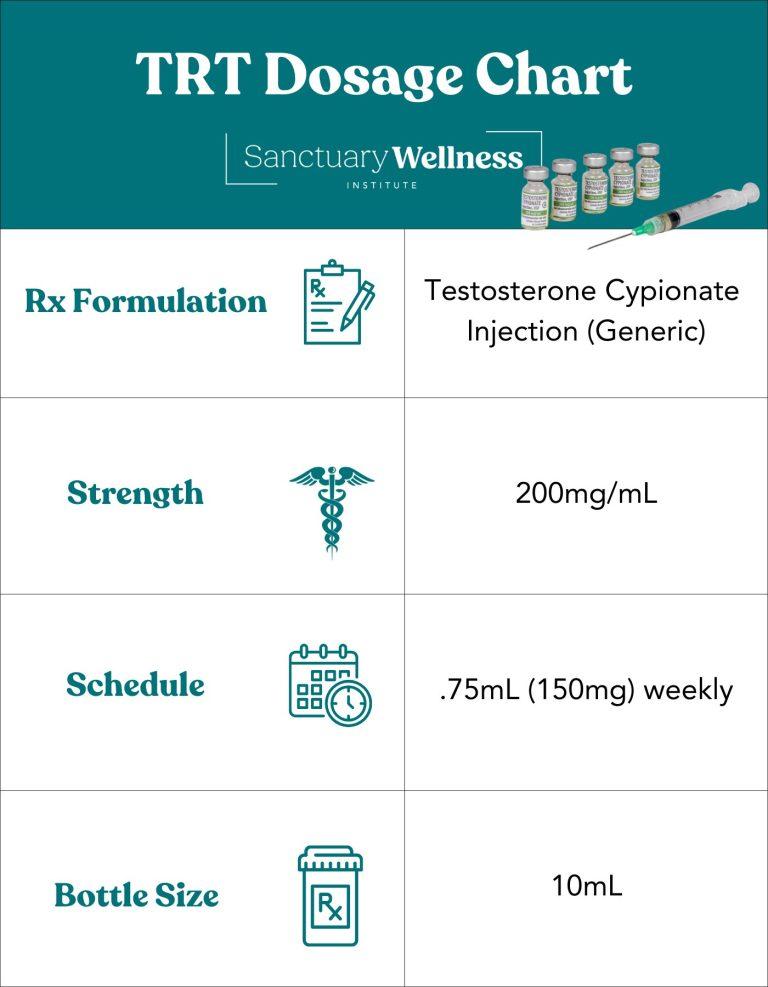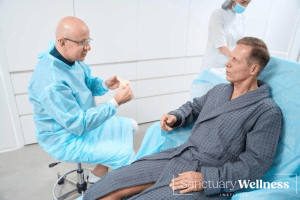- Fact-checked by Dr. Desiree Granados

Testosterone Replacement Therapy (TRT) is a beneficial treatment for men with low testosterone, helping them regain energy, mental clarity, and physical health. However, finding the right TRT dosage is crucial to achieving optimal results and minimizing side effects.
This guide explores the process of determining, adjusting, and safely monitoring TRT dosage, offering practical advice to help you get the most from your therapy.
Factors that Influence TRT Dosage
TRT dosage requirements vary widely from person to person, as many factors impact how testosterone interacts with the body. Here are some of the primary influences:
- Age: Testosterone production naturally declines with age. Older men may need a higher dosage to reach the levels typically associated with younger individuals.
- Baseline Testosterone Levels: Initial testosterone levels are critical for determining dosage. Men with very low baseline testosterone may require a higher starting dose to restore balance effectively.
- Body Composition: Muscle mass and body fat percentage affect testosterone absorption and metabolism. Those with higher body fat may need a different dosage than leaner men to achieve similar effects.
- Metabolism: Faster metabolisms may process testosterone more quickly, sometimes requiring higher or more frequent dosing to maintain stable levels.
- Individual Health Goals: TRT can serve a range of purposes, from improving energy and mood to enhancing muscle mass. Different goals may necessitate adjustments in dosage.
- Lifestyle and Health History: Diet, exercise habits, and any history of health conditions (like liver issues) also impact how your body responds to TRT.
Given the importance of these factors, finding the right TRT dosage is a personalized process best done with a healthcare provider who can account for each of these variables.
How to Determine the Right TRT Dosage for You
When starting TRT, it’s essential to establish a starting dosage that’s both safe and effective. Dosages will differ from person to person, but here are key steps in determining the right TRT dosage:
- Medical Evaluation: Your provider will conduct a full health evaluation, reviewing any conditions that could affect TRT’s effectiveness and safety. This step is crucial to establish a safe baseline.
- Baseline Hormone Testing: Blood tests to measure your starting testosterone levels help determine the appropriate starting dosage and serve as a reference point for future adjustments.
- Initial Dosage Range: While every individual’s needs are unique, an initial dosage range might fall between 50 – 100 mg of testosterone per week. This range serves as a general guideline, but adjustments may be necessary as therapy progresses.
- Professional Guidance: Your provider will consider your age, baseline levels, and health goals when determining an appropriate starting dosage. After an initial trial period, they may recommend adjusting the dosage based on your body’s response.
TRT Dosage Chart
A dosage chart can provide a visual guide to common dosage ranges, though exact requirements vary individually. This is what a sample chart might look like:
- RX Formulation: Testosterone Cypionate Injection (Generic)
- Strength: 200mg/mL
- Schedule: Inject .75mL (150mg) weekly
- Bottle Size: 10mL

This chart gives general guidelines and should not replace professional consultation, as dosage needs differ widely from person to person. At The Sanctuary, we always customize our patients’ dosage based on their specific needs.
Adjusting Your TRT Dosage Over Time
Dosage adjustments are often necessary as your body adapts to TRT. Regular check-ins with your provider allow you to make informed adjustments based on changes in your health, symptoms, and lab results. Common reasons for dosage adjustments include:
- Blood Test Results: Routine blood work is essential to monitor testosterone levels. If levels are too high or too low, your provider may recommend dosage adjustments.
- Monitoring Symptoms: Your energy levels, libido, mood, and physical progress serve as indicators of how well your current dosage is working. If symptoms remain unchanged or worsen, a change in dosage might be needed.
- Physiological Changes: As your body composition, metabolism, and health change over time, your TRT dosage requirements may shift as well.
- Consultation with Your Provider: Always discuss any potential changes with your healthcare provider, who can guide you through safe and effective adjustments.
Regular assessments and adjustments ensure that TRT continues to meet your body’s needs as they evolve.
Signs of Improper Testosterone Dosage
Correct TRT dosage is essential to avoid potential side effects or ineffectiveness. Here are some signs that your dosage might be too high or too low:
- Signs of a Too-High Dosage: High doses of testosterone can cause side effects like acne, mood swings, increased aggression, and elevated red blood cell counts. Long-term overuse can also lead to cardiovascular risks.
- Signs of a Too-Low Dosage: If the dosage is too low, you may not see improvement in symptoms, such as energy levels or mood. Insufficient doses can also limit benefits to muscle mass, libido, and mental clarity.
Finding the right balance requires periodic evaluations, including blood tests and assessments of physical and emotional changes. Working with a healthcare provider is the best way to ensure your dosage remains safe and effective.
Conclusion
Determining and maintaining the right dosage in Testosterone Replacement Therapy is crucial for achieving optimal health outcomes. With the correct dosage, TRT can help men regain energy, confidence, and physical vitality. Because dosage requirements vary widely from individual to individual, a personalized approach is essential.
Working closely with a healthcare provider ensures that your TRT dosage is tailored to meet your specific needs, safely and effectively. Regular monitoring and adjustments, guided by professional insight, allow you to optimize your therapy as your body’s requirements evolve.
At The Sanctuary, we’re dedicated to providing individualized TRT programs based on thorough assessments and expert guidance. By focusing on safe, evidence-based practices, we aim to support you in achieving the best possible results with TRT. For more information on how TRT could benefit you, explore our testosterone replacement therapy services.
How we reviewed this article:
- Nobuyuki Kondoh, Yohei Kaizuka, Seiji Nagasawa, Yoshikazu Togo, Shingo Yamamoto (2023). Predictive factors for efficacy of testosterone replacement therapy for late-onset hypogonadism in Japanese men: a preliminary report
https://pmc.ncbi.nlm.nih.gov/articles/PMC10521961/ - Mayo Clinic (2024). Testosterone (intramuscular route, subcutaneous route)
https://www.mayoclinic.org/drugs-supplements/testosterone-intramuscular-route-subcutaneous-route/description/drg-20095183 - Omeed Sizar, Stephen W. Leslie, Jose Pico (2023). Androgen Replacement
https://www.ncbi.nlm.nih.gov/books/NBK - Jayne Leonard (2023). What are the signs of high testosterone in males?
https://www.medicalnewstoday.com/articles/signs-of-high-testosterone - Ryan Wallace (2023). Signs and Symptoms of Low Testosterone
https://www.healthline.com/health/low-testosterone/warning-signs#_noHeaderPrefixedContent
Current Version
November 21, 2024
Written By
John DiBella
Fact-checked By
Dr. Desiree Granados
Editorial Process
Our Editorial Process

Nicholas DiBella received his psychology degree from West Chester University of Pennsylvania and has been writing content for the Sanctuary Wellness Institute since 2023. He is passionate about all things cannabis.







